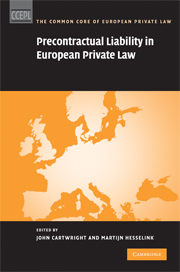Book contents
- Frontmatter
- Contents
- General editors' preface
- Preface
- List of contributors
- Abbreviations
- Note on translations of foreign language statutory provisions
- 1 Introduction
- 2 Case studies
- 3 From the common law to the civil law: the experience of Israel
- 4 A law and economics perspective on precontractual liability
- 5 Conclusions
- Bibliography
- Index
4 - A law and economics perspective on precontractual liability
Published online by Cambridge University Press: 10 August 2009
- Frontmatter
- Contents
- General editors' preface
- Preface
- List of contributors
- Abbreviations
- Note on translations of foreign language statutory provisions
- 1 Introduction
- 2 Case studies
- 3 From the common law to the civil law: the experience of Israel
- 4 A law and economics perspective on precontractual liability
- 5 Conclusions
- Bibliography
- Index
Summary
The problem
Negotiations are the natural prelude to a binding agreement. During negotiations, parties evaluate contractual opportunities and define the terms of a mutually profitable transaction with an informal exchange. They speak with each other and communicate their respective interests and expectations regarding the potential transaction. During these interactions, the parties often preserve a certain degree of ‘freedom of negotiation’. Before entering into a binding contract, parties retain some freedom to change their mind, to negotiate with other prospective parties, to acquire information to verify the profitability of the proposed transaction, and to hold out if changes in the circumstances or some other aspect of the transaction make it unprofitable. A necessary consequence of the parties' freedom of negotiation is the lack of binding force of their manifestations of intent. Expressions of intent during the negotiation phase do not bind the parties and generally cannot be used to obtain performance before a contract is finalised. Negotiations enable parties to test the feasibility of a mutually beneficial transaction.
During negotiations, as information is gathered and the prospective contract begins to take shape, it may become reasonable for parties to make some reliance investments. From an economic perspective, these reliance investments may indeed be beneficial (for one party or for both) because they can increase the value of the contract, if the parties enter into one. While potentially increasing the net private surplus from the transaction, these ‘relation-specific investments’, however, always involve some risk.
- Type
- Chapter
- Information
- Precontractual Liability in European Private Law , pp. 431 - 448Publisher: Cambridge University PressPrint publication year: 2009
- 1
- Cited by

